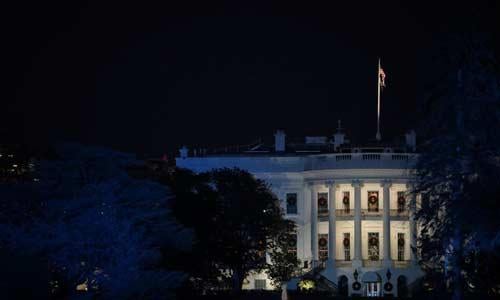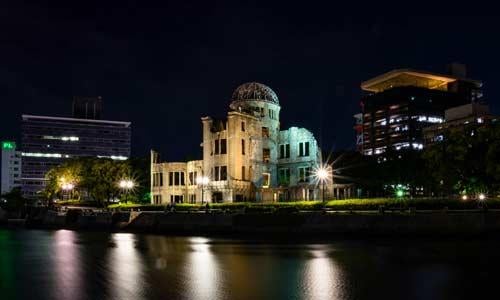Dr. Tara Drozdenko, physicist and national security expert, explains why nuclear weapons should never be on the table in a global conflict
In this episode
Colleen and Tara discuss:
- implications of Russia putting its nuclear weapons on alert
- President Biden's and NATO's response
- solutions to reducing the threat of nuclear war
Timing and cues
Opener (0:00-0:31)
Intro (0:31-2:32)
Interview p1 (2:32-13:28)
Break (13:28-14:17)
Interview p2 (14:17-24:49)
Outro (24:49-26:25)
Credits
Editing: Colleen MacDonald
Additional editing and music: Brian Middleton
Research and writing: Pamela Worth and Cana Tagawa
Executive producer: Rich Hayes
Host: Colleen MacDonald
Related content
Full transcript
Colleen: If you’re a person of a certain age like I am… born, raised, and then some during the Cold War… the past few weeks may be giving you flashbacks to some tense times, as the nuclear-armed state of Russia invades Ukraine.
When I heard that President Vladimir Putin had elevated Russian nuclear weapons into a higher state of alert at the end of February… I thought of the Cuban Missile Crisis, Dr. Strangelove, and those scary duck-and-cover drills for schoolkids.
Of course, you don’t have to remember the Cold War to be alarmed by the implications of the current war. It’s just that I’ve lived through this particular kind of dread before… and it feels disquietingly familiar.
That dread is among the many reasons why I work for an organization trying to minimize the risk of nuclear war. No one should have to feel it.
This is why my Union of Concerned Scientists colleagues in our Global Security Program, which works for sensible and safe nuclear weapons policies in the US, have issued a statement condemning the Russian government’s aggression in Ukraine. Their statement makes clear that nuclear-armed states have a singular responsibility to pursue diplomatic solutions to conflict—and that the threats of deploying nuclear weapons are unacceptable.
Conventional war is already horrific, as we’re seeing in Ukraine. An escalated, prolonged conflict could displace millions. Russia threatening to wield its nuclear weaponry raises the stakes for truly devastating consequences.
My colleague Dr. Tara Drozdenko is the director of our Global Security Program, a physicist by training and a national security expert. She joined me to discuss the security implications of the Russian invasion… what it means that Russian nuclear weapons are on higher alert… the importance of de-escalation… and what all of this could mean for nuclear weapons policies in the future.
Colleen: Tara, welcome to the podcast. Tara: Thank you. I'm very glad to be here.
Colleen: So, in light of the very dire situation in the Ukraine, this just seemed like the right time to get you on the podcast, mostly to walk us through some questions about nuclear weapons and, of course, the implications of Russia putting their nuclear weapons on alert. Putin announced that Russia has put its nuclear forces on higher alert. What does that mean and just how risky is this?
Tara: Yeah, so I'm not a Russian nuclear forces expert but I do think there's been some uncertainty about exactly what that meant when Putin said that. And from what I've read, there doesn't seem to be a whole lot of change in Russia's nuclear forces, perhaps maybe more staff at various facilities. So that's the good news. The bad news is that even the announcement of it, Putin's decision is just an unnecessary escalation of the situation. And in a time of tension like this, it increases the risk of a mistake, either, through misunderstanding, miscalculation. We just wanna stay as far away from the threat of nuclear use as we can. And so that wasn't a good move on Putin's part, but it is a good sign that the U.S. and NATO allies have resisted responding to that by escalating our own readiness levels. So that's a good thing. Rather than focus too much on Putin's announcement, the fact of the matter is that this is really an unprecedented situation right now. Along with the fall of the Soviet Union, it's probably the most consequential event relating to nuclear weapons in my lifetime. So we need to be thinking about de-escalating the situation to ensure that there are threats of nuclear use, and, of course, ending the violence against the Ukrainian people.
Colleen: So has this happened before where a nuclear-armed country is threatening to attack a country with conventional weapons and then issuing nuclear threats to the rest of the world?
Tara: To my knowledge, this is a pretty unique situation. You know, we had vague... When Trump was in office, he mentioned something about North Korea, best not go there, or they will receive fire and fury, and he talked about his bigger nuclear button. But North Korea, of course, has nuclear weapons. And then historically, there's some reporting that during the Vietnam War, senior military officials were doing contingency planning for deploying tactical nukes there, but President Johnson put a stop to it. And that was never really in the public eye, so, at least not too much. So these moves by Russia to publicly threaten nuclear use during this conflict are unprecedented and dangerous.
Colleen: And to be perfectly clear, these are the nuclear weapons that we had nightmares about, I mean, those of us that grew up in the Cold War. Are the nuclear weapons they've put on alert as destructive as Hiroshima and Nagasaki? Are they the same?
Tara: Yeah, they're more destructive. They are 20 to 30 times more destructive than the weapons that were used on Hiroshima and Nagasaki. And any use of nuclear weapons, even smaller ones, risks starting what's called an escalation ladder, where once each side just starts responding to the other by one-upping things, and then it risks running all the way up to a full-scale nuclear war, which would be a civilization-ending event. And the U.S. and Russia understand that. They, about a month ago, put out a statement affirming that a nuclear war can never be won and must never be fought. So that's just to re-emphasize. That's why, in this situation, we wanna do all that we can not to escalate the situation and to take nuclear weapons off the table in this conflict.
Colleen: So, Tara, when we hear talk of tactical nuclear weapons or nuclear weapons being introduced into a conventional war, I think many people imagine that those are somehow smaller and the destructive power is more on scale with the conventional weapon. Is that true?
Tara: No. The tactical versus strategic nuclear weapons really has to do more with the range of the weapon. So the tactical weapons are gonna be a shorter range and something employed to be used on a battlefield to hit a nearby military target. They may have a lower yield than some of our strategic weapons, but not necessarily. They might be just as large yield-wise. But even so, even if we're on the smaller end of yield, they're still gonna be in the range of like a Hiroshima or Nagasaki size bomb. And using these tactical nuclear weapons is a very real risk that you would end up, like I mentioned before, this escalation ladder where the final outcome is a full-scale nuclear war between the U.S. and Russia. So we want to avoid tactical use as well.
Colleen: In terms of the U.S. nuclear forces, what are the different alert levels, and what are the risks of accidents and miscalculations when we start increasing the alert status?
Tara: Sure, So the U.S. does have varying levels of readiness known as defense conditions. And that's shortened to DEFCON. So people may have heard of DEFCON 1, DEFCON 2, but our land-based and submarine-based missiles are always ready to launch within minutes, no matter what the defense condition is. So in a sense, they're always on alert. Our nuclear weapons could be launched at any time. All that we need is an order from the President. And over the years, we've had a disturbing number of close calls and accidents. We've had early warning radars mistake natural phenomena for missile launches. There have been technical glitches that caused operators to lose contact with our early warning radars or other parts of the U.S. military complex involved in nuclear strikes. And in one incident, a training tape was inserted into a NORAD computer, and it simulated a large-scale Soviet attack that appeared real to the operators. And in that incident, the U.S. ICBM force was placed on its highest alert level, and nuclear bombers were prepared for takeoff. Thankfully, none of those close calls led to an accidental nuclear war. But in times of tension like we have right now, mistakes like these can lead to unintentional escalation. But we don't have to be resigned to that danger. There are things that we could do to reduce the risk of misunderstanding and miscalculation. For one, we could declare a no first use policy, which means that the U.S. would commit to never being the first to use nuclear weapons in a conflict. And this would assure countries like Russia, in the event of tensions, that we're not gonna be the ones to start a nuclear war.
Secondly, we could end the President's sole authority to launch nuclear weapons and involve other officials in the decision to launch. Right now, the decision to launch nuclear weapons lies solely with the President. And with our policy of launch on warning of a nuclear attack, the President has to make a decision to launch in just a few minutes. And that's a very dangerous situation to be in, in particular, in a situation of tension like right now. We could also take our land-based missiles off of hair-trigger alert.
Colleen: Can you explain what hair-trigger alert is?
Tara: Yeah, so as I mentioned before, our missiles are ready to launch at a moment's notice, 24 hours a day, 7 days a week. All that needs to be done is the President has to make a decision to do it. But that, you know, we don't have to have our missiles in that state of readiness all the time. We could, for example, take the warheads off of the ICBMs and store them separately, so that the decision to use them would have to be much more deliberate. We'd have to reinstall those warheads on to the missiles before they were used. So, that's another thing that we could do. And that would significantly lower any risk of mistake, or miscalculation, and nuclear war. And if any one of these policies was in place right now, I think the risk of misunderstanding or miscalculation would be a lot lower.
Colleen: So how did we end up with the President having sole authority to launch a nuclear weapon?
Tara: So the reason that the U.S. has a sole authority set up is sort of happenstance. Back during World War II, when they were first developing the nuclear bomb, the U.S. military had planned to use it multiple times, and they were planning to use the nuclear weapon on Japan, even after the Nagasaki bombing. And when President Truman found out about it, he asserted his right there as commander-in-chief to make a decision about when it would be used. And he wrote to his advisors, something along the lines of, "Don't use this unless I say it's okay." And so right then and there, President Truman, at the very genesis of nuclear weapons, asserted his right as president. And that's sort of how it's been ever since. We've given our presidents the sole authority to launch, and we don't have to have it that way. In fact, UCS has some proposals to include the Vice President and the Speaker of the House in a decision of that magnitude. And I think other countries have their decision-making authority set up differently, too. So, yeah, it's just sort of a quirk of history in some respects.
Colleen: So no first use, getting rid of sole authority, and taking our weapons off of hair-trigger alerts seem like really sensible solutions that would have a stabilizing effect. Is there a reason why that hasn't happened?
Tara: Well, I think, historically, people have wanted to give the President as much flexibility as possible when it comes to nuclear weapons. And in the middle of the Cold War, in particular, that was of, you know, concern. Post-Cold War, I think we've been in a much different situation. And it is time to reevaluate these policies and put in place a less risky situation.
Colleen: It seems like we're closer now to a nuclear war than we ever have been before. Has anything like this happened before?
Tara: Well, certainly not in my lifetime. I think, and you mentioned this too, before those of us who grew up during the Cold War, this is, to my mind, the most dangerous situation we've been in. But historically, I do think that we were closer during the Cuban Missile Crisis. And there's an incident that illustrates that pretty graphically. And we didn't learn about this incident until like a decade or so ago. So it was obscured for a long time. But what happened during the naval blockade of Cuba was that the Soviets had sent four submarines out to Cuba. And while they were en route, the U.S. set up a blockade of the island so that none of the Soviet ships could get through. And the Soviet submarines had orders to protect the Soviet ships, and the Americans didn't know it, but each of those submarines carried 15 kiloton nuclear torpedoes. And that's the same yield size as the bombs at Hiroshima and Nagasaki. And each of those submarines commanders had authorization to launch those torpedoes without having to call back to Moscow and check first. It was up to their discretion. I think there was a system set up where there were three officers that needed to agree to the launch on a ship. And the Navy ships didn't know this, they didn't know there were nukes onboard. They didn't know about the pre-delegated launch authority. And they were trying to get the Soviet submarines to surface. So they were dropping what are known as practice depth charges on the subs. They were not destructive. They were not actually destructive explosives. But they were loud, and the Soviet sub-commanders assumed that they were under attack. And they debated within the submarine whether they should launch their nuclear torpedoes. And thankfully, they decided not to launch them. But if they had, then things might have escalated to a full-scale nuclear war. And this incident just really shows the peril that we are in when tensions and conflict are hot between nuclear-armed states. And so, again, we wanna try to find ways to mitigate that risk, and step away from that tension and that escalation as much as possible.
Colleen: Yeah, I think that example illustrates that, perhaps by having three people who had to agree to launch those torpedoes, that goes back to when you were talking about the President having sole authority to launch, it seems like changing that might be a good move.
Tara: Yeah. Yeah. And in that situation, it probably prevented a nuclear war.
Colleen: So what should the West do to end this conflict and move us away from a world where these types of nuclear threats can't happen anymore?
Tara: Yeah, what the West can do is continue to make sure that they don't needlessly escalate the situation. Now that the threat of nuclear use has been introduced by Putin, we can support the surge of refugees that are fleeing. We can condemn the racism that we're hearing about from people trying to flee their region. We can continue to apply diplomatic and economic pressure. But ultimately, the crisis like the one in Ukraine is the very reason why we need to reduce and eventually eliminate nuclear weapons.
Colleen: And what did you make of President Biden's response to their heightened alert?
Tara: The U.S. and NATO had a very measured response. They chose not to increase the alert status of our own nuclear forces. And I think that was exactly the right move. The last thing that we want right now is to move things up the escalation ladder. So I applaud their decision not to do that.
Colleen: And what are the diplomatic options being employed?
Tara: Right now, the most visible actions from the West are extreme sanctions and aid to Ukraine. And these actions are coordinated across many different governments and are probably taking into account collateral effects on innocent populations, in particular, with the economic sanctions. So, I think it's difficult for me as an outsider to sit here and second guess those actions given the limited information I have. But, from the outside view, I think that's what's most visible right now.
Colleen: So what role are the countries that border the Ukraine, what role are they playing in this nuclear situation?
Tara: Well, there were some military exercises that were sort of a pretext, prior to the invasion for moving in a large number of troops. And very recently, Belarus voted to change their constitution to allow them to host nuclear weapons on their territory. And what that did was then sort of give the possibility that if Russia wanted to put some tactical nuclear weapons into Belarus, they could, and then that would, in turn, threaten Ukraine with nuclear attack. And, you know, that hasn't moved forward yet. It's just that change in their constitution was made. So again, that's another potentially escalatory move and is a threatening of nuclear use in this situation that we wanna discourage and back away from.
Colleen: In terms of the sheer number of nuclear weapons that are out there, how many nuclear weapons does Russia have?
Tara: So, Russia currently has around 6,000 warheads, but not all of these are deployed. Some of them are slated for retirement. According to New START, which is an arms control treaty between the U.S. and Russia, Russia is allowed to have 1,500 launchers deployed. And we know that Russia is in compliance with this treaty. So, you know, a fraction of the 6,000 warheads that they have are probably deployed, you know, maybe a substantial fraction. But even so, that's enough to cause a very significant amount of damage in the event of a full-scale nuclear war.
Colleen: Right. And in addition to the blast and what happens on the ground, you then have massive radiation and potential clouds of radiation that will contaminate other areas.
Tara: Yes, there's a number of effects from nuclear weapons. The first, of course, is a blast. There's also an area where people would receive a lethal dose of radiation. Outside that there's an area where people would receive a number...like third-degree burns over most of their body, which would be fatal, just not immediately. So the number of wounded would probably be comparable to the number of fatalities. And those wounded would likely not be able to receive medical care, because first responders wouldn't be able to get into the area. And so you'd have more fatalities as the days and weeks went on. It's absolutely not a situation that we want to get into.
Colleen: And you mentioned that the U.S. has had close calls. Do you know if Russia has had any close calls with their weapons?
Tara: Yeah, we have less insight into that than we do of the U.S. But there's at least one that I can recall, and it's not too distant in time. In 1995, Norway launched a scientific rocket to study the aurora borealis. And to Russian early-warning radars, it looked like it could have been a launch from a nuclear submarine. And apparently, the Russian president was notified, presented with the means to authorize a retaliatory strike, which is similar to, you know, how our president would be given what is called the nuclear football. But when the radars didn't show any additional launches, the incident was declared a false alarm. That incident took place during a time of low tension between the U.S. and Russia. So if something like that were to occur now, like in the midst of this particular incident, the outcome could be very different.
Colleen: Is there a role for the average person to play, to try to change some of these policies?
Tara: Yeah, absolutely. UCS has a membership base and we have an activist base. And if someone wanted to get involved, they could sign up and learn how to start advocating about these issues, both just to a general audience and to their own elected officials. So I would highly recommend that if people wanted to get involved that they sign up for our newsletters, that they reach out to UCS and figure out ways to start learning how to become an advocate about these issues.
Colleen: Well, Putin seems to have painted himself into a corner. What do you see as the best possible outcome?
Tara: Well, if I wanted to be really optimistic about thisI could say that this event could be a catalyst for future conversations about more arms control and more nuclear risk reduction if we are... That's where I can place my hope there.
Colleen: Great. Well, Tara, I know you will be watching the situation closely. I wanna thank you for taking the time to help me and our listeners understand just how dangerous this type of escalation can be. And hopefully, we'll see things ratchet down in the very near future.
Tara: Yes, let's hope.



